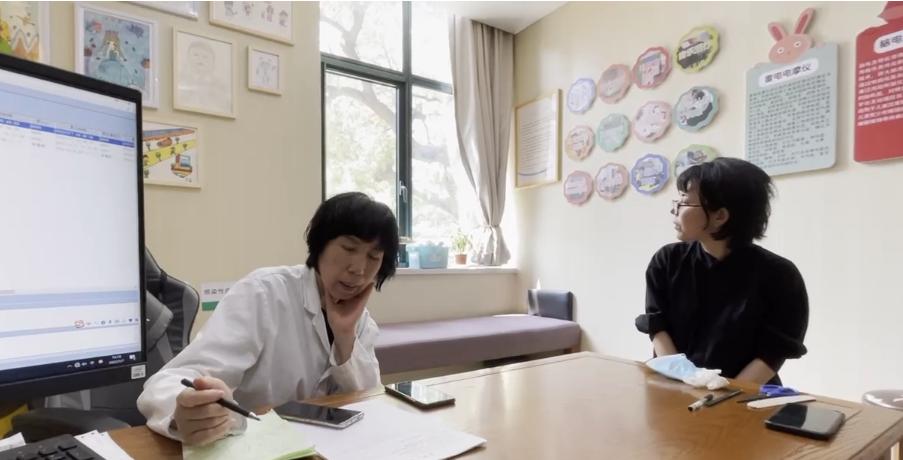Hangzhou Fudan Director Chen Hong and Zhang Jinhua psychotherapist are giving parents online remote consultation and giving parents scientific treatment advice.

The matter also starts from 2021, 12-year-old Xiao Xue is in the sixth grade of primary school, after being examined by doctors with emotional disorderS, ADHD, Internet addiction, and unwilling to go to school. Later, after being hospitalized in our hospital, her mood improved a lot, and Xiao Xue also successfully graduated and entered the junior high school section. Although Xiao Xue's emotional disorder has eased, it still needs to be guided and treated in terms of attention.
Xiao Xue has entered junior high school, and parents are more concerned about learning this aspect, thinking about whether they can help Xiao Xue improve his attention to learning, and whether he can improve his academic performance. The goal of this remote consultation is very clear, for the child's attention, hope to get a good solution, but emphasize that they do not want to use medication.
Our hospital has opened an online consultation mode, and you can also see a doctor at home.
What are the common mood disorders in children?
Childhood mood disorder is a group of diseases that occur in children and adolescents with anxiety, depression and fear as the main manifestations, and the incidence of mental and psychological problems in children is higher, and girls are significantly higher than boys. Common types are anxiety disorders, phobias, school phobias, obsessive-compulsive disorders, depression and hysteria.
Children are affected by various factors in the process of psychological development, mainly their own quality, family environment, kindergarten and school environment, and social environment; Children's brain development is not yet mature, the psychological state is very unstable, it is easy to be affected by these factors, especially the genetic susceptibility to adverse environmental factors, often appear a variety of emotional problems.
Anxiety is one of the main manifestations of emotional disorders in children. Small children are often overly worried about separation from the closest or attached person, also known as separation anxiety, such as crying when separated from their parents, not eating or sleeping, but also can appear nausea, abdominal pain and other physical symptoms, or unrealistic fear of relatives accidents, etc.: older children can have social anxiety, nervousness when interacting with people.
Fear emotions are also a common emotional problem in childhood, there have been studies that 90% of children have a temporary fear response at a certain stage of development, generally speaking, this is a normal phenomenon, will not affect life and learning, with age will disappear on its own, such as fear of darkness, fear of thunder, fear of some animals and so on. However, if the fear shown by the child greatly exceeds the actual degree of harm, or in fact there is no danger at all but the fear is very frightening, and the emotion of fear lasts for a considerable period of time, resulting in avoidance and withdrawal behavior, which has a serious impact on normal life, learning, and social interaction, and the persuasion is ineffective, then the child's fear phenomenon has reached a morbid degree and should be considered for treatment for phobias, such as fear of going to school and refusing to go to school, fear of seeing people and not willing to go out, etc.
Children's depression is more caused by psychological stimulation, such as separation from parents, family discord, punishment, poor examinations, etc., from infants to adolescents can occur, and children are more common after the age of 8. Children's performance is different in different periods, generally manifested as: low mood, crying, temper tantrums, decreased interest, low self-evaluation, declining academic performance, and even self-harm, suicidal behavior and so on.
In short, if children are found to have emotional abnormalities, they should pay attention to it and find a psychologist in time.
Some parents, because of their work or life, often become angry at the "disobedient" children's habit of beating and scolding and casting a "shadow" on early education. For this reason, modern psychologists in the United States pointed out that tutoring is an art of whether children are obedient or not, depending on whether parents teach fang to take too many scolding to coerce children to "obey" and "obey", which will backfire.
Love is the premise
In a very cohesive family, love is a bridge between thoughts and feelings.
Calm
When an adult is excited, he can say something that he later regrets. If there is anger to be suppressed first and then the emotions are stable, we are not easily angry with adults, and this attitude is also suitable for our own children.
There should be no more words
Nagging often causes children to turn a deaf ear, and this kind of preaching often begins with "when I am as old as you", followed by words such as "in the future you will understand yourself" because children grow up in a real environment, parental education is best to use popular language to guide things according to snobbery.
Respect children
Give your children a say in discussing day-to-day chores. It's always easier to discuss things with your child. At the same time, it also made him aware of his position and identity in the family.
Listen patiently
The child has something to say to him, don't interrupt the conversation at will, and when he is finished, you may wish to repeat his main meaning, find out the end, and then make suggestions. If the child loses the beloved thing, even if it is insignificant to the adult, the parent must have enough patience to satisfy the child's childish heart.
Master the timing
The child has something to say to him, don't interrupt the conversation at will, and when he is finished, you may wish to repeat his main meaning, find out the end, and then make suggestions. If the child loses the beloved thing, even if it is insignificant to the adult, the parent must have enough patience to satisfy the child's childish heart.